February 3, 2006
William Gibson: No Maps for These Territories
Year: 2000
Directed by: Mark Neale
Written by: Mark Neale
Degree of Cyberpunk Visuals: Very Low
Correlation to Cyberpunk Themes: Low
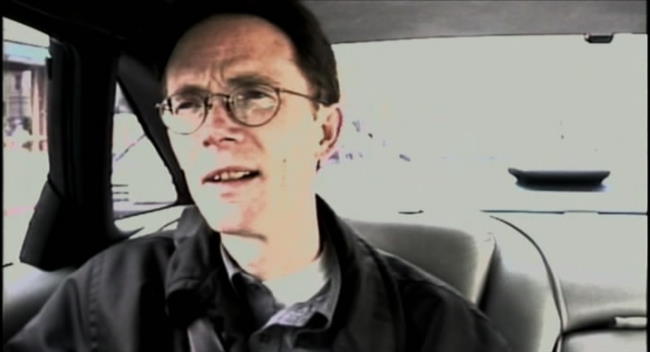
Overview: I notice the decent IMDB rating for No Maps, but honestly, I just don’t see it. I have hard time coming up with something positive to say as No Maps for These Territories as a documentary on Gibson fails in virtually all aspects possible. You have to look long and hard to find a documentary with this little attention to detail across the board. No Maps has horrible lighting, haphazard editing and “FX” choices which detract even more from the mess that’s already on screen. In short, this film seems to be sending the message that William Gibson is a meandering scatterbrain who occasionally comes up with an interesting idea or two, but who, for reasons not of his own making, was able to become wildly popular. None of this is true of course, which is why this documentary resonates so badly with me.
Because I also gave New Rose Hotel a horrible rating, I want to be VERY clear about something – I think William Gibson is one of the most influential writers of the later part of the 20th century. His stuff is better than great. In no way does my knocking these movies reflect at all on my opinion of his literary works or his legacy. Nor do I believe that Gibson’s works cannot be very successfully transferred on-screen. Unfortunately, Gibson has yet to find his Peter Jackson.
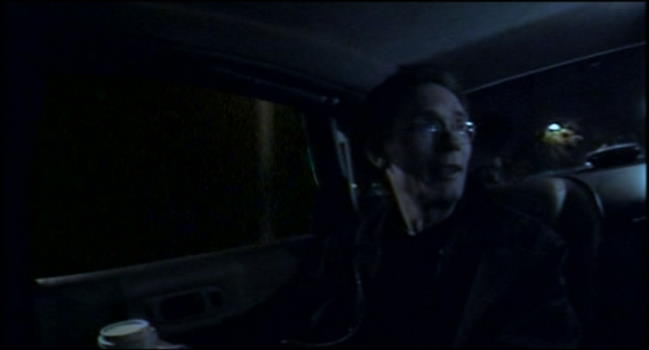
The Setting: A significant part of my dislike for No Maps is based on the decision to use a car as the setting. In thinking about it, it’s really hard to imagine a worse way to conduct a documentary. The entire thing takes place with Mark Neale, the director, driving a car while talking to Gibson, who is in the back seat surrounded by a few of set cameras. In using this approach, Neale was able to generate the worst of all scenarios:
- Neale has to focus on driving so he has absolutely NO control over the cameras. This continually leads to horribly over or under-exposed shots of Gibson, grainy, and out of focus film and horrible positioning.
- Because Neale has to concentrate on driving, whatever skills he might have had as an interviewer are compromised by the fact that he’s in massive multitasking mode – he’s driving and continually checking the recording while attempting conducting an interview. My guess is after a while, Neale just wanted to make sure Gibson was talking, and stopped bothering listening to what was being said.
- Every now and then, Gibson would utter a terrific insight, such as when he mentioned that the internet all but ensured the end of the nation state. This would have been a great time for a prompting follow-up from an astute interviewer, but unfortunately, we get absolutely NO follow-up on this and many similar fascinating comments.
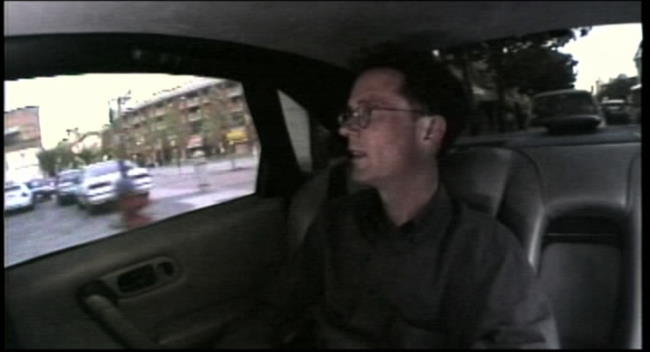
What the Cinematography Conveyed: Probably the most dissapointing aspect of No Maps relates to the unintentional visual symbols the “road trip” documentary provided. Gibson is known as a trailblazer – a thought leader in setting the course for science fiction, yet the interview in the back of the car makes him seem like someone happy to follow along someone else’s path. The title, “No Maps for These Territories ” is supposed to convey that Gibson went into un-chartered waters, yet everything in this documentary, from the meandering and repetitive music to the monotonous car ride, makes Gibson come across as someone who basically just intellectually wanders around and hopes he happens upon something interesting. In short – there was a map of the territory – it was in Gibson’s mind. This film works hard to obfuscates that fact:
- The constant penchant to splice in absolutely random images in rapid succession whenever Gibson philosophizes tends to make Gibson’s message come off as incoherent.
- The repetitive music consistenty has this meandering quality, which again, reinforces the message that Gibson wanders around through life and occaisionally gets lucky.
- The “special effects” where Neale haphazardly transferred separate drive-by the images onto the side and rear window and back side of the car so that what was coming through rear window no longer matched the side window (see image directly above for an example) served NO PURPOSE AT ALL other than to distract the viewer from Gibson’s oratory.
- The complete inattention to lighting or setting makes the entire project comparable to a neighbor’s home movie. It’s almost as if Neale was consciously trying to make Gibson (and Sterling) look as shabby as possible with the hopes that it made them more “edgy” or “real.” If this was the intent, my apologies for missing how this was helpful.
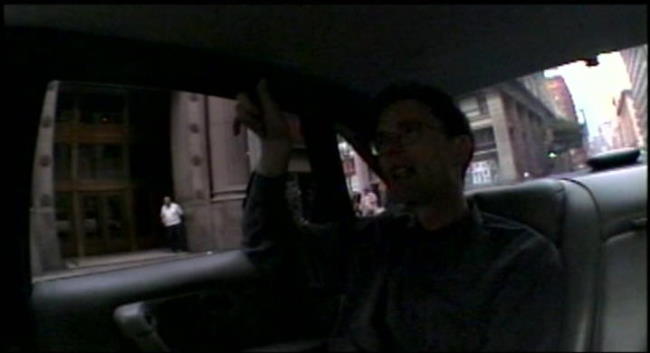
Perhaps the goal was either to break up the monotony of staring at Gibson in a back seat of a car for 88 minutes, or maybe it was done with the hope of making Gibson’s oratory seem non-linear, but what seems to be conveyed is that Gibson’s ideas aren’t really connected in any real way. In line with this, Gibson as the “meanderer” is re-enforced by poor editing decisions. While a few segments such as the internet one seem to have a nice flow, most segments are all over the non-existent map. What Neale unintentionally seems to convey is that if you keep a camera on Gibson long enough, like the rest of us, he’ll eventually come up with a a number of half-formed, off-the-cuff comments that go absolutely nowhere.
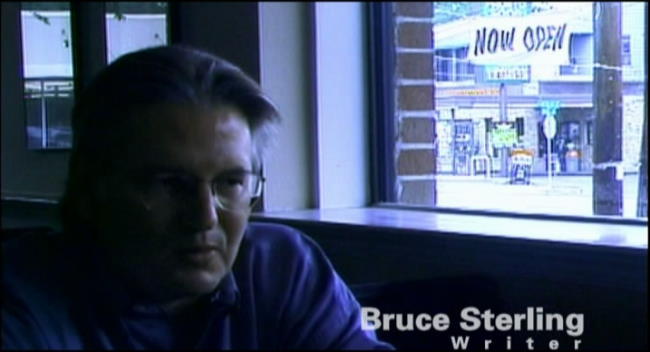
Neuromancer’s Legacy: One thing we do learn from No Maps is that Gibson, like many great innovators, is probably the worst person to talk about his place in history, and in particular, the relevance of his earlier works like Neuromancer. When it comes to discussing his legacy, Gibson is extremely modest. He’s also a perfectionist when it comes to evaluating his prose. As he gets older, he negatively judges his earlier and discounts their value and overall importance. In discussing Neuromancer, Gibson calls it a simplistic book – as simplistic as cheesy three-chord progression songs in Album Oriented Rock music in fact, and that only teenage Goths should ever find it appealing. Never mind that it won all possible scifi awards (Hugo Award, Philip K. Dick Memorial Award, Nebula Award, Seiun Award, and Ditmar Award) and defined a whole new genre of science fiction, or that it changed the vocabulary and concepts the world over (the concept of cyberspace, for instance), Gibson still considers it pretty sophomoric. This leads to the clear implication that those who see something more in Neuromancer, or any of his 80s works, are also of the intellectual caliber of teenage Goths. Yet, in his five minute interview at a cheesy restaurant (also with shitty lighting), Bruce Sterling is able to provide more context on Neuromancer’s place in history than Gibson does for the rest of the film. Sterling points out clearly that while Gibson as an older man looking back at his life may have the right to criticize himself, but this doesn’t change the fact that he was a damn good writer back then who transformed the face of science fiction – I only wish there was an interviewer in this capable of pinning Gibson down on this. While Gibson may or may not like the prose, the ideas proposed clearly had intrinsic worth, and every so often, even Gibson acknowledges this.
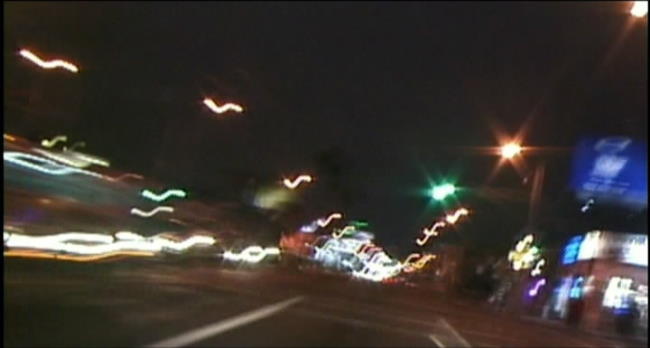
The Bottom Line: On the whole, this documentary performed a disservice to Gibson and his legacy. Those who have never been exposed to Gibson will watch this and conclude that Gibson was a lucky bystander in history who seemed to be at the right place at the right time. If you’re already a Gibson fan, you may get a bunch of interesting and honest tidbits from his past, but little else will be gained. In watching No Maps, I really found myself wishing that Neale had just gotten a semi-decent interviewer to sit down with Gibson in a quiet setting and interview him. Also, far more time should have been given to Gibson’s contemporaries, who clearly have a better sense of Gibson’s significants than he does. Had Neale taken this approach (one might call this a traditional documentary approach for lack of a better description), the result would have been FAR superior to the mess that this documentary produced. Again, the problem wasn’t that No Maps was produced on a shoestring budget, the problems arose from the choices made (using a moving car as the setting, where the director/interviewer/cameraman/driver was one in the same person, and the subsequent editing decisions). Yes, the name of the documentary is VERY cool, but very little else should be saved. Gibson deserves better. If history is kind, No Maps will be forgotten, and at some point, a quality documentary will be made that highlights Gibson’s most impressive legacy.
~See movies similar to this one~
Tags: cyberpunk movie review Gibson Territory Maps





Comments
February 9, 2006
k said:
” … Nor do I believe that Gibson’s works cannot be very successfully transferred on-screen … ” mm, agree, i came out of a movie in a totally unrelated genre a year or so back “The Bourne Supremacy” and my immediate odd thought was, ‘yeah, these guys could really do neuromancer’; saw it a few times and came up with the same answer; check it out, perhaps
SFAM said:
Hi K, welcome! Hmm…I love the Bourne Movies, although the choppy action in Supremacy made me like it less than Identity. Still, you’re right in that they took risks enough in that movie that normally aren’t there in Hollywood scripts (what happened to his bride, for instance). It is a good movie storywise, for sure.
March 21, 2007
Not Necessary said:
This “reviewer” clearly has no business watching movies. They seem preoccupied with such small details that they overall picture has eluded them. However, I’m not sure what else I would expect for a “cyberpunk” review site.
SFAM said:
Hi Not Necessary - the overall picture eluded me? What aspect was that? I’m truly interested now.
March 14, 2010
PoetDragon said:
Great reviews! I love the attention to details and the full break-down of the movies!
October 21, 2010
Adam Askov said:
This is a great documentary. I honestly don’t understand that low score. That must be based on what they reviewer expected and not on the actual quality of the film. It’s one of the best Gibson interviews ever made.
March 29, 2011
Penultimate truth said:
SFAM makes great points that make total sense. I just think people can’t let go of the idea that you somehow shame Gibson by giving it a low score, when in fact - unlike Gibson’s books etc - this movie does deserve a low score. Go QQ elsewhere : P
April 21, 2011
Fathis Hull said:
Not having seen this movie, I do have one comment on the following:
“In short, this film seems to be sending the message that William Gibson is a meandering scatterbrain who occasionally comes up with an interesting idea or two, but who, for reasons not of his own making, was able to become wildly popular. None of this is true of course, which is why this documentary resonates so badly with me.”
You HAVE actually read Neuromancer, haven’t you? Meandering scatterbrain is right. Or, is it just that the words are so jumbled and meaningless that you consider it art? If there is a worse literary mistake in the history of prose, I have yet to find it.
Also, Gibson becoming wildly popular while remaining clueless, I would have to give a very wide NO on that one, also. Yes, the drug-addled minds of the coming-adult generation, pre-gaming, may have taken what they were able to glean from that spaghetti mess called Neuromancer and turned it into something more, but it was the ever-expanding addictive culture of the USA, and of R. Talsorian’s gaming company, that turned it into more than that.
I think the documentary ‘resonates’ so badly with you because you weren’t stoned enough to watch it with the same brain you read his novels with.
August 10, 2011
Icarus said:
I’m surprised you gave this such a low rating and disliked it so much. I liked it. Yes, it was a bit free-flowing, but it was just listening to Gibson’s reflections of his work, and how the time passed from 1980 to modern culture surrounding cyberpunk. It wasn’t some big production, you can tell it was just someones low budget interviews of william gibson and sterling. From the way you wrote the review it kind of seems like you totally don’t take this into account. WG kind of IS a long and drawn out “rambling” kind of person, and he DIDNT get majorly iconically famous for the way he looked, because he doesn’t fit the shiny-leather-clad-w/-mirrorshades kind of persona that his works might portray. He didn’t even get an iPad or a significant piece of modern 21st century technology until 2010. He is a writer, and he got iconically majorly famous because of his writings, and in this film he …talks… about them *GASP*. I mean what did you want?
I think you were in a bad mood when you watched this. You should re-examine your position, or let someone else give a more fair portrayal because the basis you gave and listed just seem “jaded”.
September 20, 2011
capnsid said:
You’re all missing the point: SFAM isn’t knocking the director, merely the distracting blue-screen window shots, and the sparse questioning. Also, WTF does Bono have to do with it, besides, I believe, doing a track on the old Neuromancer audio tapes, read by Gisbon? I mean REALLY?
Plus, for those of you who think Gibson is merely a ‘meandering scatterbrain’ , I’ve met the man on two occasions, and he always gives readings in academic, or literacy-oriented, locations, like universities and bookstores. Not like at a comic shop, though that would be cool. And much of his audience tends to be academic, so no, Faiths Hull, Neuromancer isn’t ‘jumbled and meaningless’, you’re just jaded. Or sound so, at any rot.
Not surprising, considering most onliners today are so ADD and OCD-addled, they don’y even know how to spell or punctuate proplerly.
capnsid said:
You’re all missing the point: SFAM isn’t knocking the director, merely the distracting blue-screen window shots, and the sparse questioning. Also, WTF does Bono have to do with it, besides, I believe, doing a track on the old Neuromancer audio tapes, read by Gisbon? I mean REALLY?
Plus, for those of you who think Gibson is merely a ‘meandering scatterbrain’ , I’ve met the man on two occasions, and he always gives readings in academic, or literacy-oriented, locations, like universities and bookstores. Not like at a comic shop, though that would be cool. And much of his audience tends to be academic, so no, Faiths Hull, Neuromancer isn’t ‘jumbled and meaningless’, you’re just jaded. Or sound so, at any rot.
Not surprising, considering most onliners today are so ADD and OCD-addled, they don’t even know how to spell or punctuate proplerly.
November 17, 2011
Village Idiot said:
William Gibson is a classic example of how drugs and more importantly, postmodernism can fuck up your mind.